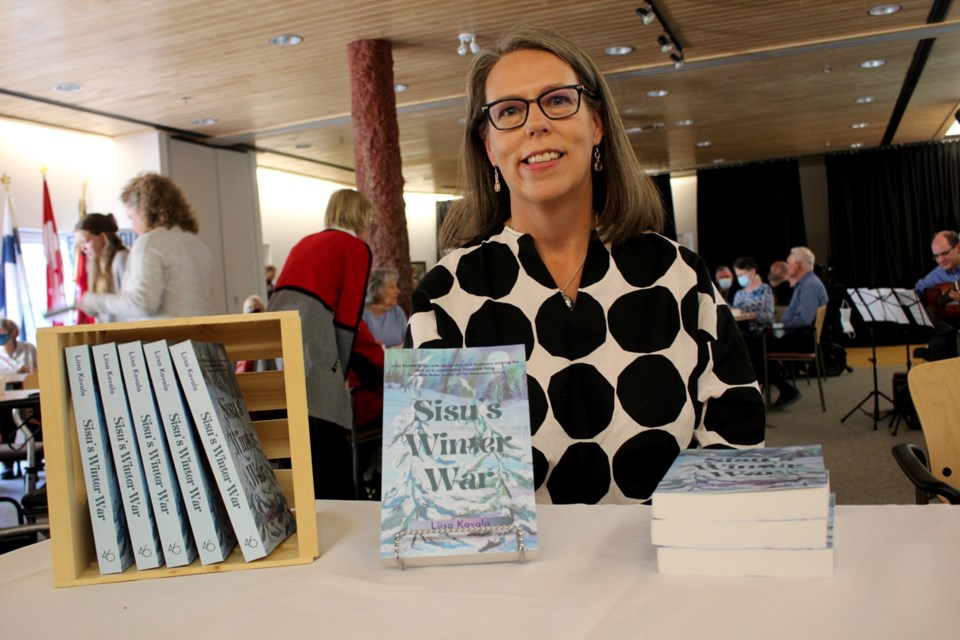As she did in her first book, Sudbury author and retired teacher Liisa Kovala draws on her Finnish heritage for her second book, “Sisu’s Winter War.”
Released this month by local publisher Latitude 46, the book features main character Meri Saari, who makes a promise to her dying mother that she would keep the family together, but she was too young to know how a war can pull people apart.
With the Soviet invasion of Finland, Meri pledges loyalty to the Lotta Svärds and becomes the sole caretaker for her siblings. When her father goes missing in action, she finds herself searching for him on the front lines.
Forty years later, living in Northern Ontario, Meri’s past and present collide when she is diagnosed with early onset Alzheimer’s.
Responsible for her granddaughter, and navigating a strained relationship with her daughter Linnea, Meri is haunted by the people of her past and by the promises she failed to keep.
As she struggles against her inevitable decline, she knows her losses are amassing: her home, her health, and her memories. Meri embarks on one last journey in search of the man she had to give up, before it’s too late. Before everything disappears.
Kovala’s first book, “Surviving Stutthof: My father's memories behind the Death Gate,” describes her now-late father Aarne Kovala’s experiences as a Finnish teenage merchant marine during the Second World War.
It was originally self-published under another title in 2015, but was picked up by local publishing company Latitude 46 in 2017. The book was shortlisted for a Northern Lit Award and published in Finland under the title “Stutthofin selviytyjä”.
As she worked with her father to write his memoirs, Kovala became interested in what happened to the Finnish women left at home during wartime.
The Winter War was a 105-day war between the Soviet Union and Finland, which began with a Soviet invasion of Finland Nov. 30, 1939, three months after the outbreak of the Second World War.
It ended three and a half months later with the Moscow Peace Treaty, on March 13, 1940. Despite superior military strength, especially in tanks and aircraft, the Soviet Union suffered severe losses and initially made little headway.
Hostilities ceased in March 1940 with the signing of the Moscow Peace Treaty in which Finland ceded nine per cent of its territory to the Soviet Union.
“I really just wanted to know more about what happened during that war and what really was going on,” Kovala said. “I was really also interested in the women who were left behind.”
She said her father was a young kid during the Winter War, but some of her aunts joined the Lotta Svärds, a Finnish voluntary auxiliary paramilitary organisation for women, who performed volunteer work.
“We're seeing so many more stories about what women did during the war,” Kovala said, such as French women taking part in the resistance, British women who were code breakers, and, in the case of her new book, the Finnish Lotta Svärds.
Kovala said she’s noticed that historical fiction novels with female protagonists set in the Second World War have become a popular genre in recent years, perhaps because enough time has now passed since these events.
“So we're getting a better picture of what happened during wartime, because so often, in the past, we've heard the stories of the soldiers and what was happening on the front line,” she said.
The Winter War happened more than 80 years ago, but Kovala said it has relevence to the present, given the parallels with Russia’s 2022 invasion of Ukraine.
“When I was writing this book, obviously, the events of Ukraine and Russia hadn't started,” she said.
“But it's interesting to see how that is playing out in a similar way. The Ukrainians are really coming together and fighting off this giant country, and, you know, Finland did the same. Finland wasn't successful, but they really pulled together and made really valiant efforts against the Russian forces.”
While the title of the book refers to the Winter War in Finland, Kovala said it also ties into the second part of the novel, referring to the final season of main character Meri’s life, as she struggles with early onset Alzheimer’s.
“I think that she's approaching the end,” she said. “It's about the symbolic winter of your life. So there is that conflict in the Winter War, where she's going through all kinds of trials. But now later in her life, the trials have changed. They’re very personal. She's taking care of a granddaughter that she's afraid of losing as a result of the Alzheimer's.”
The protagonist Meri’s childhood nickname is “Sisu,” hence the title. Sisu is a Finnish word that doesn’t have an exact English translation, but it has been defined “as grit, or perseverance or resilience, determination in the face of great adversity.”
“Whe shows that she's kind of a brave little girl when she's young, and she gets this nickname Sisu,” Kovala said.
“But it turns out, it's a real characteristic for her, and she needs to use that inner strength throughout the story in all kinds of different ways, and it's what keeps her moving forward, even when it looks impossible …
“So her Sisu is both a nickname but also a character trait that she brings with her both the timeline of the Winter War, but also as an older person with her diagnosis.”
A launch for “Sisu’s Winter War” was held at Finlandia Village Oct. 2. Kovala said the book is available online through your favourite booksellers, as well as Latitude 46’s online book shop. She said she also plans to be at the Sudbury Market this Saturday between 11 a.m. and 1 p.m., where she will be selling and signing books.
Heidi Ulrichsen is Sudbury.com’s associate content editor. She also covers education and the arts scene.
